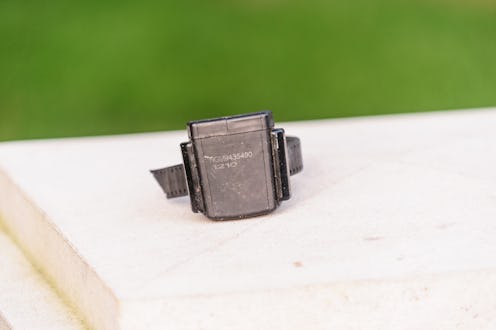News
Is Tracking Sex Offenders For Life Constitutional?

In a case over whether or not the Fourth Amendment right that prohibits unreasonable search and seizures was violated, the Supreme Court declared Torrey Dale Grady could challenge the North Carolina decision that allows the justice system to monitor him with a GPS tracking system for the rest of his life. On Monday, the Supreme Court reversed the North Carolina courts' sex offender judicial decision, which stated that the lifetime monitoring was constitutional and didn't count as a Fourth Amendment violation because it is a program created under civil, not criminal law. The Supreme Court found that the Fourth Amendment applies regardless of which judicial area it is created.
Grady was named a repeat sex offender — he was convicted of a second-degree sexual offense when he was 17 years old in 1996, and then he was charged and convicted of "taking indecent liberties with a child" who was 15 years old, 10 years later in 2006. Because of his recidivist status, Grady was declared a high risk and became an involuntary participant of North Carolina's monitoring program. Using the Fourth Amendment, Grady challenged the decision, stating that it was an unreasonable search — the program allows state officials to enter his home unannounced to check the machine. The Supreme Court's opinion said:
The state's program is plainly designed to obtain information. And since it does so by physically intruding on a subject's body, it effects a Fourth Amendment search.
Now, the Supreme Court's reversal does not automatically take Grady off of GPS monitoring — it merely declared that Grady can challenge it in the lower court. The Supreme Court did not make a decision on whether Grady's situation was considered unreasonable or not. Grady's lawyer, Lewis Everett, said he recognizes that his client, as a twice-convicted sex offender, does not have the expectation of regular privacy. But, he argued, monitoring Grady by GPS 24/7 for the rest of his life — during which Grady must spend four to six hours plugged into a wall to charge the monitor — is too intrusive of a punishment to be considered constitutional.
More than 40 states have some kind of electronic monitoring system for offenders who are released from prison. Around eight states, including North Carolina, have lifetime surveillance for sex offenders. A research study sponsored by the National Institute of Justice found that sex offenders who are GPS monitored will commit fewer crimes than those who are monitored by the traditional parole officer supervision. But Lisa Bishop, a senior parole officer in California, wrote that there are many challenges of monitoring of sex offenders, including that the electronic supervision tells where an offender is located, but not what they are doing there; there's an increased workload and cost; and if a sex offender does leave the area, authorities cannot track an offender where they have no jurisdiction. She writes:
Placing sex offenders on GPS for life has huge implications for law enforcement, as the law does not specify many basic details of implementation, including which sex offenders require supervision, who should monitor them, how to define the restrictions on living near places where children congregate, and how to pay for GPS tracking, which could ultimately cost hundreds of millions of dollars a year.
Now headed back to the lower courts, Grady will face a decision of whether or not his specific case is considered a reasonable or unreasonable search under the Fourth Amendment. Researchers who studied when the GPS data becomes detailed enough to qualify as unreasonable determined that about a week of location data would be considered an unreasonable search. But whether that logic will apply in Grady's sex offense case remains to be seen.
Images: kgnixer/Flickr; Getty Images (1)